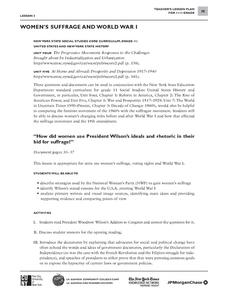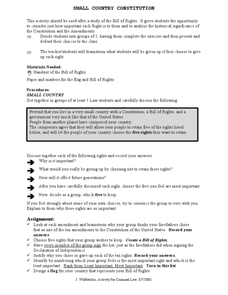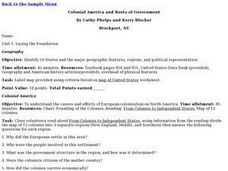Council for Economic Education
Tax Time Scavenger Hunt
Is a 1040EZ tax form really easy? Scholars investigate the complexities of the United States taxation system with an economics lesson. Using a wide variety of web sources, they interpret IRS taxation rules and regulations to better...
US National Archives
Documented Rights Educational Lesson Plan
How have groups struggled to have their unalienable rights recognized in the United States? Acting as a research team for the Human Rights Council of the United Nations, your young historians will break into groups to research...
City University of New York
Woman's Suffrage and World War I
How did women use President Wilson's ideals and rhetoric in their bid for suffrage? To answer this essential question, class groups analyze primary written documents and visual images.
Museum of Tolerance
The Pursuit of Democracy and Diversity: The Trial of Pro-Social Injustice in Historical Documents and Accounts
Class members investigate The Indian Removal Act of 1830, U.S. Theft of Mexican Territory Timeline, and President Abraham Lincoln’s letter to Horace Greeley, 1862, and then conduct a mock trial of each of these documents to determine...
Turabian Teacher Collaborative
Parts of Argument II: Article Critique
Break down the parts of argumentative writing with a critical thinking activity. High schoolers read an article of your (or their choice), and use a graphic organizer to delineate the ways the author structures his or her arguments.
Teaching Tolerance
Changing Demographics: What Can We Do to Promote Respect?
America has always been seen as a melting pot to the world. Scholars research the concept of blending cultures in the United States and how it is changing over time. The final lesson of a four-part series analyzes the changing...
Penguin Books
Core Curriculum Lesson Plans for Jefferson's Sons
Thomas Jefferson lived a controversial life. A series of lesson plans shares information about Jefferson's Sons, a novel about the infamous founding father. Discussion questions and other tasks explore different points of view and cover...
Curated OER
Role of the Government
Namely through discussion, get your opinionated scholars examining the roles of government- is it even necessary? They analyze the quote: "To be free, one must be chained," writing what it represents and then sharing. Consider...
National Endowment for the Humanities
The President Under the Articles of Confederation
The Articles of Confederation sounds like one big, fancy title to middle schoolers. Here, scaffolded steps help to ease novices into understanding this all-important American document. Discussion questions, lesson activities, and ideas...
Southern Nevada Regional Professional Development Program
Common Core Reading Standards: Understanding Argument
What does your class know about logical fallacies? They can find out quite a bit and practice identifying logical fallacies if you follow the steps and use the resources provided here! After reviewing ethos, pathos, and logos, ask small...
Curated OER
Stamp Act: Virtual Representation vs. Actual Representation
Eleventh graders research and discuss the different points of view of colonists in terms of taxation, as well as how these viewpoints helped lead to the revolution.
Curated OER
Small Country Constitution
Students pretend they live in a very small country with a Constitution, and Bill of Rights, like that of the US. People from another planet conquer the country, but allow them to retain five rights. They choose the five rights they want...
Curated OER
The Importance of Being Flexible and Open-minded as a Visitor to Another Culture: Lesson 2 For "The Train Ride Home"
Students examine the advantages of being flexible when visiting or living in a different culture. They read and discuss a first-hand account by a Peace Corps volunteer in Kazakhstan, and write a letter from the point of view of a...
Curated OER
Washington Irving in Context
Students examine the various roles Washington Irving had in his lifetime. Examining the situation in Europe and the United States, they are encouraged to relate Irving's experiences to different events. They examine themselves in many...
Curated OER
Basic U.S. Geography
Provide your 11th graders with a basic understanding of U.S. Geography. They label the state, regions, and boundaries found in the contiguous U.S. as well as Hawaii and Alaska. Then, they complete two Internet related activities.
Curated OER
Sleuthing A Writer's Skills
Students read The Train Ride Home by Robin Solomon. In this literature response lesson, students will inspect the writing of Solomon to determine how she established a certain tone through her word choice and...
Curated OER
Examining Women's Roles through Primary Sources and Literature
High schoolers interpret historical evidence presented in primary resources. In this women's history lesson, students examine the role of women prior to and following the suffrage movement. High schoolers also read selected pieces of...
Curated OER
Presidential Biography: Bicentennial Quarter
A biography is a type of literary genre that everyone needs to be familiar with. Here, the class will read two different biographies of George Washington and discuss how they are similar and different, then decide weather they can glean...
Curated OER
Colonial America and Roots of Government
Students identify 50 States and the major geographic features, regions, and political representation of each. In connection, they investigate the causes and effects of European colonization on North America. They identify the formation...
Curated OER
Celebrate the Constitution
Students explore the process of writing our Constitution through an interactive program. They are to put themselves in the place of the statesmen and predict how they felt at the time. They compare the founding fathers.
Curated OER
Racism: Law and Attitude
Students examine discrimination laws. In this racism lesson, students compare and contrast de facto and de jure discrimination. Students also explore the Bill of Rights and determine what makes some acts and speech illegal.
Curated OER
Four Enlightenment Thinkers
Students examine lives, philosophies, and political beliefs of four Enlightenment Thinkers: Baron de Montesquieu, Jean-Jacques Rousseau, Thomas Hobbes, and John Locke. Students then work with partner to write short speech from...
Curated OER
Founding Myths, Stories that Hide Our Patriotic Past
Students participate in a scavenger hunt using their textbooks to find information about historical events, people and places in US history during the Revolutionary Era. After creating their list of important people, students create...
National Endowment for the Humanities
Slavery and the American Founding: The "Inconsistency Not to Be Excused"
High schoolers examine slavery in the revolutionary and colonial eras of the United States. In this slavery lesson, high schoolers investigate the presence of slavery in early America, the language of the Constitution, and the intent of...

























